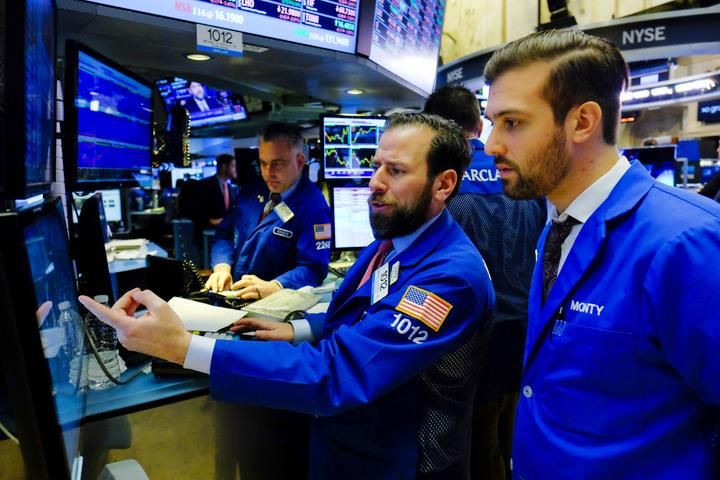Dow Jones Industrial Average Rises After Previous Rocky Session; Global Markets Are In A Bear Market

This story was updated at 4:15 p.m. EST.
Investors went bargain hunting on Friday, a day after stocks sharply dropped on elevated fears of economic weakness and the health of the European banking system. U.S. shares were lifted by better-than-expected retail sales data showing consumer spending regained some momentum in January. Oil prices and U.S. bank stocks sharply rebounded Friday, too, as the Dow and S&P ended a five-day losing streak.
“The markets may have decided that the U.S. is headed for recession, but obviously no one told U.S. consumers,” said Paul Ashworth, chief U.S. economist for Capital Economics.
The Dow Jones Industrial Average (INDEXDJX:.DJI) ended the last session of the week up 313.66 points, or 2 percent, at 15,973.84. The broader Standard & Poor's 500 index (INDEXSP:.INX) gained 35.70 points, or 1.95 percent to 1,864.78. The Nasdaq composite (INDEXNASDAQ:.IXIC) rose 70.68 points, or 1.66 percent, to 4,337.51.
The positive swing comes after a widely watched index of global markets dropped 20 percent from its all-time high in May, which means stocks worldwide are now in a bear market. While U.S. markets are still considered bullish, the Dow and S&P have fallen 13 percent from their previous recent highs and the Nasdaq is down 17 percent. Markets are considered bearish when they drop 20 percent from previous recent peaks.
Global markets, many of which have already turned to bear status, ended the week down.
The S&P 500 fell 1 percent for the week and is down 9 percent for the year. The German DAX shed 3 percent this week and has lost 17 percent this year. The British FTSE fell 2 percent this week and 9 percent this year. Most Asian markets were closed for all or part of the trading week for the Lunar New Year holiday. Hong Kong’s Hang Seng lost 5 percent over two days and is down 16 percent for the year. Japan’s Nikkei index lost 12 percent during its four-day trading week and is down 21 percent for the year.
In the U.S. nine out of 10 S&P 500 sectors ended Friday up, led by financials and materials. Utilities were down. JPMorgan Chase & Co. (NYSE:JPM) and Goldman Sachs Group Inc. (NYSE:GS) led Dow gains.
Markets got a lift Friday morning from New York Federal Reserve President William Dudley, a Fed voting member whose comments are closely watched. Speaking in New York City after the release of a quarterly report on household debt and credit, Dudley said the U.S. economy remains healthy and the banking system “clearly stronger” that it was before the 2007-09 financial crisis.
Safe Harbor Bets
The benchmark U.S. 10-year Treasury yield climbed to 1.737 after hitting its lowest level in more than two years on Thursday. The bond yield typically rises when investors are more confident about the markets and falls when concerns flare. Gold, another so-called safe harbor investment, was lower from its one-year high on Thursday, shedding 0.65 percent to $1,238.21. Gold prices tend to rise as confidence in the markets falls.
Oil Prices
Oil prices rose sharply as traders digested U.S. consumer data and a signal from OPEC member United Arab Emirates that coordinated production cuts might be in the offing.
U.S. West Texas Intermediate gained 12.32 percent to $29.44 per barrel for March delivery on the New York Mercantile Exchange. Brent crude, the other major global benchmark, gained 10.48 percent to $33.21 for April delivery on the London ICE Futures Exchange.
Global Markets
Asian and European stock markets moved in opposite directions.
Hong Kong’s Hang Seng shed 1.22 percent on its second trading day of the week following the Lunar New Year holiday. It lost nearly 4 percent Thursday. Chinese mainland markets are closed for the week. On Monday, they reopen while U.S. markets will be closed for the President’s Day holiday. Japan’s Nikkei shed 4.84 percent, ending a rocky week on a down note after the country’s central bank sent bond yields into negative territory.
Shares rallied in Europe after regional bank and materials stocks were hammered on Thursday. The broad Stoxx Europe 600 index closed up 2.78 percent on Friday. The Paris-based CAC 40 was up 2.52 percent, while London’s FTSE advanced 3.08 percent. Frankfurt’s DAX rose 2.45 percent.
Market Movers
Stock in America’s top bank JPMorgan Chase & Co. (NYSE:JPM) gained more than 8 percent by the closing bell on Friday after President and CEO Jamie Dimon purchased 500,000 shares for $26.6 million. The bank’s stock has lost 20 percent of its value this year, following other banks over concern that sluggish economic activity and rising borrowing rates would hurt bank earnings.
Pandora Media Inc. (NYSE:P) shares plunged about 12 percent Friday after a report emerged the money-bleeding music streamer is shopping for a buyer. The company has annual revenues of about $1 billion with roughly 250 million users. But it’s losing about $10 million a month.
American International Group Inc. (NYSE:AIG) stock gained nearly 5 percent after the company announced billionaire John Paulson, a representative of activist investor Carl Icahn, was named to its board. The move means the company avoids a boardroom fight, but still leaves the largest commercial insurer in the U.S.open to Icahn’s demand to break itself into three smaller companies. The stock gained despite AIG reporting larger-than-expected losses in its quarter ending in December.
Payment processing and hardware startup Square Inc. (NYSE:SQ) stock jumped more than 8 percent Friday after Visa Inc. (NYSE:V) disclosed a 9.99 percent stake in the company co-founded by Twitter’s Jack Dorsey.
Boeing Co. (NYSE:BA) ended Friday slightly up after reports emerged the aerospace giant was reportedly being investigated by the Securities and Exchange Commission for alleged accounting fraud. The stock was still down nearly 7 percent since the opening bell Thursday hours before the news broke.
© Copyright IBTimes 2025. All rights reserved.






















